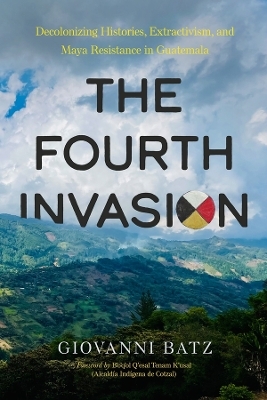
The Fourth Invasion
Decolonizing Histories, Extractivism, and Maya Resistance in Guatemala
Seiten
2024
University of California Press (Verlag)
978-0-520-40173-0 (ISBN)
University of California Press (Verlag)
978-0-520-40173-0 (ISBN)
- Lieferbar (Termin unbekannt)
- Versandkostenfrei
- Auch auf Rechnung
- Artikel merken
A free ebook version of this title is available through Luminos, University of California Press’s Open Access publishing program. Visit www.luminosoa.org to learn more.
Based on more than a decade of ethnographic research, The Fourth Invasion examines an Ixil Maya community’s movement against the construction of one of the largest hydroelectric plants in Guatemala. The arrival of the Palo Viejo hydroelectric plant (built by the Italian corporation Enel Green Power) to the municipality of Cotzal highlighted the ongoing violence inflicted on Ixils by outsiders and the Guatemalan state. Locals referred to the building of the hydroelectric plant as the “new invasion” or “fourth invasion” for its similarity to preceding invasions: Spanish colonization, the creation of the plantation economy, and the state-led genocide during the Guatemalan armed conflict. Through a historical account of cyclical waves of invasions and resistance in Cotzal during the four invasions, Giovanni Batz argues that extractivist industries are a continuation of a colonial logic of extraction based on the displacement and destruction of Indigenous Peoples' territories and values that has existed since the arrival of the Spanish in 1524. The current movements in Cotzal, rooted in a long history of resistance, counter dominant narratives of Indigenous Peoples that often portray them as “conquered.”
Based on more than a decade of ethnographic research, The Fourth Invasion examines an Ixil Maya community’s movement against the construction of one of the largest hydroelectric plants in Guatemala. The arrival of the Palo Viejo hydroelectric plant (built by the Italian corporation Enel Green Power) to the municipality of Cotzal highlighted the ongoing violence inflicted on Ixils by outsiders and the Guatemalan state. Locals referred to the building of the hydroelectric plant as the “new invasion” or “fourth invasion” for its similarity to preceding invasions: Spanish colonization, the creation of the plantation economy, and the state-led genocide during the Guatemalan armed conflict. Through a historical account of cyclical waves of invasions and resistance in Cotzal during the four invasions, Giovanni Batz argues that extractivist industries are a continuation of a colonial logic of extraction based on the displacement and destruction of Indigenous Peoples' territories and values that has existed since the arrival of the Spanish in 1524. The current movements in Cotzal, rooted in a long history of resistance, counter dominant narratives of Indigenous Peoples that often portray them as “conquered.”
Giovanni Batz (Maya K'iche') is Assistant Professor of Chicana and Chicano Studies at the University of California, Santa Barbara. Foreword by B’o’q’ol Q’esal Tenam K’usal (Alcaldía Indígena de Cotzal).
| Erscheinungsdatum | 29.10.2024 |
|---|---|
| Zusatzinfo | 15 color illustrations, 7 tables |
| Verlagsort | Berkerley |
| Sprache | englisch |
| Maße | 152 x 229 mm |
| Gewicht | 408 g |
| Themenwelt | Sachbuch/Ratgeber ► Gesundheit / Leben / Psychologie |
| Sozialwissenschaften ► Ethnologie | |
| Sozialwissenschaften ► Soziologie | |
| ISBN-10 | 0-520-40173-5 / 0520401735 |
| ISBN-13 | 978-0-520-40173-0 / 9780520401730 |
| Zustand | Neuware |
| Haben Sie eine Frage zum Produkt? |
Mehr entdecken
aus dem Bereich
aus dem Bereich
selbstbewusst für den eigenen Körper entscheiden : Sex, Zyklus, …
Buch | Hardcover (2024)
Insel Verlag
CHF 41,95
für naturheilkundliche, physiotherapeutische und ästhetische …
Buch | Softcover (2024)
Urban & Fischer in Elsevier (Verlag)
CHF 55,95
Buch | Softcover (2024)
Tyrolia (Verlag)
CHF 38,90


